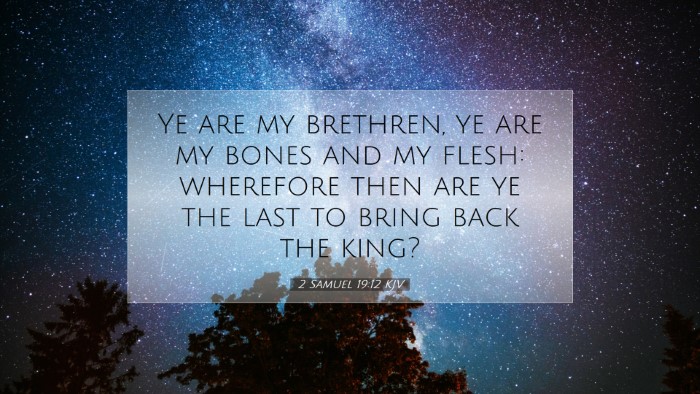Commentary on 2 Samuel 19:12
Verse (2 Samuel 19:12): "You are my brothers, you are my bone and my flesh. Why then are you the last to bring back the king?"
Context and Background
This passage comes at a pivotal moment in David's reign. Following Absalom’s rebellion, David faced profound personal and political turmoil. This verse reflects David’s emotional plea as he longs for reconciliation and restoration with the tribes of Israel who had once supported him.
Insights from Commentaries
Matthew Henry's Commentary
Matthew Henry highlights the significance of familial language used by David, referring to the Israelites as "brothers" and "bone and flesh." This terminology emphasizes unity and the essential kinship that should exist within the community of God’s people. Henry notes that David's emotional appeal indicates both yearning for loyalty and a reminder of their shared identity.
Albert Barnes' Notes on the Bible
Albert Barnes elaborates on the political implications of David’s statement. He posits that David’s return to power was critically dependent on the support of all tribes, particularly those hesitating to back him post-Absalom's upheaval. Barnes suggests that David’s rhetorical question, "Why then are you the last to bring back the king?" served as both an indictment of their delay and a call to action. He emphasizes that David’s appeal reflects wisdom in leadership, challenging them to reconsider their position and reaffirm loyalty to their rightful king.
Adam Clarke's Commentary
Adam Clarke provides an insightful discussion on the emotional undertones in David's message. He draws attention to the bond of kinships within Israel and underscores the ironic twist of their support being slow despite their common bloodline. Clarke sees this as a moment of deep introspection for the leaders of Israel, prompting them to reflect on their decisions during the time of Absalom’s revolt and the implications of reconciliation with David.
Thematic Reflections
Unity and Reconciliation
Central to this verse is the theme of unity in the body of believers. David’s reminder that the Israelites are "bone and flesh" speaks to the divinely ordained closeness meant to characterize God’s people. The implication is that unity is not merely for political expediency, but a necessary attribute of God’s covenant community.
Leadership and Accountability
The leadership style of David epitomizes the importance of accountability. By directly addressing the tribes, he highlights their responsibility to act in alignment with God’s purposes, thus demonstrating that leaders must actively seek support while also being willing to confront inaction among their followers.
Restoration and Returning
David’s plea for the return of the king encapsulates the broader narrative of restoration that permeates the Biblical text. Just as David seeks to restore his rule, so also does God seek to restore His people from the estrangement caused by sin. This draws a parallel to the redemptive work of Christ, who invites us to return to fellowship with Him.
Application for Pastors and Theologians
For pastors and theologians, this passage calls for church leaders to mimic David’s earnestness in seeking community unity and restoration. The effective leader must create an environment where relationships are prioritized, and members are reminded of their shared identity in Christ.
Furthermore, the call to accountability remains pertinent in modern ministry. Leaders should not shy away from addressing issues head-on, especially when community trust and direction are at stake. This verse serves as an enduring reminder that disengagement is often rooted in deeper discontentment and that addressing such issues requires sensitivity and heartfelt dialogue.
Conclusion
2 Samuel 19:12 is rich with themes of brotherhood, leadership, and the necessity of reconciliation. By integrating the insights from Matthew Henry, Albert Barnes, and Adam Clarke, one may better grasp the profundity of David's words and their implications for our faith communities today. This verse challenges us not only to consider our relationships within our faith communities but also to recognize the broader implications of unity under God’s authority.


